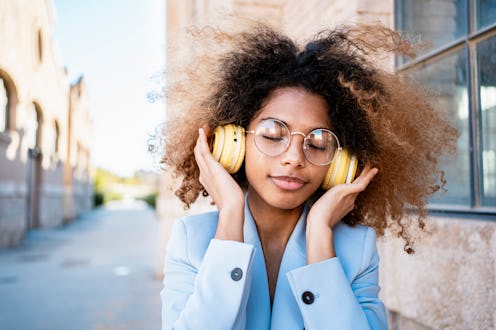Life
How Music Can Help Ease Your Next Hangover

When your head is pounding, the room is spinning, and you're definitely regretting some decisions made the previous evening, all you want is to bury your head under a pillow. However, before closing your blinds and shutting out the world, research suggests that listening to music can ease a hangover. It may seem backwards to expose yourself to noise at a time when you are super sensitive to sound. But music's therapeutic effects can ease symptoms ranging from headache, to nausea, depression, and may even help you sleep. As all of you who had a rough first day of 2016 know — anything that may provide some hangover relief is definitely worth a try.
We all have our little hangover cure secrets. You've probably heard advice ranging from take an aspirin or pain reliever before bed, drink lots of water, eat burnt popcorn (one of my quirky faves), or nosh on fried food slathered in hot sauce the next morning. But which ones will actually stop the feeling of someone jackhammering your brain? While imbibing feels pleasurable while you are at the bar, once the alcohol itself is gone, our bodies are still reeling from its effects. Drinking alters everything from our hormone production, sleep cycle, blood chemistry, and levels of inflammation. The headache is caused in a large part due to dehydration. When alcohol first enters your system "it inhibits the production of the hormone "vasopressin" from the brain, this means that water is sent directly to the bladder instead of being absorbed back into the body," explains The Independent. That, in addition to the sweating and inflammation, creates the perfect "cocktail" of pain.
According to recent studies involving migraine sufferers, listening to music you find pleasant can relieve some pain symptoms. And further studies have proved that music can have positive results for those suffering from other types of acute and chronic pain. Dr. Alexander Mauskop, director and founder of the New York Headache Center, elaborated when speaking to Mic, "We have good proof that music works for pain of any kind. There is no reason to think that hangovers would be any different. It's not as powerful as morphine, but it might be as good as Tylenol." And listening to some of your favorite tunes is a whole lot safer than taking morphine — or even Tylenol.
Of course if you are not a music person, this treatment won't offer the same relief that it would to a music-lover or musician. Those who do have a music preference though, will see some relief. Even those who love heavy metal and dubstep found migraine relief in listening to those head banging beats. But regardless of type, music is an excellent way to distract a person from asking themselves repeatedly, "Why did I have that last shot?"
Listening to one's preferred type of music may also ease the nausea aspect of a hangover. And if feeling sick to your stomach for hours on end makes you feel like you are in a black hole of misery — music can also improve general mood. By relieving depression, music is helping your levels of stress and anxiety, which, in turn lowers pain. Cheerful classical music can help relieve stress and muscle tension, in addition to promoting restful sleep.
Sadly, the only true "cure" for a hangover is sleep and time. However, the effects of drinking throw off the body's natural rhythms, making it hard to hit the hay. To get that restful night's sleep, studies suggest listening to slow repetitive classical music. A 2008 study of students suffering from poor sleep quality, found that listening to 45 minutes of relaxing classical music improved mood and reduced sleep issues.
So what should you search for when making a playlist of relaxing tunes to lull you into a restful rdejuvinative sleep? Lyz Cooper of the British Academy of Sound Therapy when speaking with Today suggests that the most restful music has no more than 60 beats per minute, is instrumental, repetitive, and has low tones. It may seem like a given, but Cooper also recommends "music that has positive memory association can also help, so music that reminds us of a relaxed and happy time." Start on that personal playlist now, and by next weekend you will be ready to try this healthy remedy for yourself!
Images: Westend61/Westend61/Getty Images, Giphy